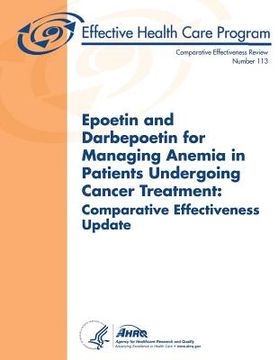Epoetin and Darbepoetin for Managing Anemia in Patients Undergoing Cancer Treatment: Comparative Effectiveness Update: Comparative Effectiveness Revie (en Inglés)
Reseña del libro "Epoetin and Darbepoetin for Managing Anemia in Patients Undergoing Cancer Treatment: Comparative Effectiveness Update: Comparative Effectiveness Revie (en Inglés)"
Anemia, a deficiency in the concentration of hemoglobin-containing red blood cells, is prevalent among cancer patients, depending on the type of malignancy and treatment. Transfusion is one option for treating anemia related to cancer and cancer treatment. Transfusion carries a very low risk of infection and other adverse events, including transfusion reactions, alloimmunization, overtransfusion, and immune modulation with theoretically possible adverse effects on tumor growth. (For example, adverse events that could be definitively attributed to transfusions were not reported in any trial included in this review for adverse event outcomes.) Erythropoietin, a hormone produced in the kidney, is the major regulator of red blood cell production (erythropoiesis). Commercially produced recombinant human erythropoietins have been extensively studied and used clinically for more than a decade to treat anemia in association with various diseases, reducing the need for transfusion. These include epoetin alfa (Epogen(R), Procrit(R)) and epoetin beta (not available in the United States); they have similar clinical efficacy. Darbepoetin alfa (Aranesp(R)), more recently developed, produces a similar physiologic response and is commercially available in the United States. All erythropoietic-stimulating agents (ESAs) increase the number of red blood cells within about 2 to 3 weeks when given to individuals with functioning erythropoiesis. The development of intensified antineoplastic therapies has increased the risk for anemia and the likelihood of treatment. Initially, adverse effects that could be conclusively attributed to erythropoietin treatment had been reported in very few patients; more recently, randomized controlled trials have reported increased incidence of thrombotic events and reduced survival. This resulted in multiple pooled analyses of ESA trial data over several years, as well as regulatory actions by the U.S. Food and Drug Administration (FDA). The Blue Cross and Blue Shield Association Technology Evaluation Center, an Evidence-based Practice Center funded by the Agency for Healthcare Research and Quality, conducted a systematic review of epoetin use in oncology (2001) and a comparative effectiveness review, "Comparative Effectiveness of Epoetin and Darbepoetin for Managing Anemia in Patients Undergoing Cancer Treatment" (2006). This update includes new evidence that was not available in 2006. In particular, we incorporated results from a recently published meta-analysis3 of individual patient data from studies enrolling more than 50 patients per arm; inclusion for this update was limited to studies of similar size. In contrast, the previous report2 included studies enrolling 10 or more patients per arm. Sensitivity analyses performed for each outcome with data from studies excluded because of size showed no differing results. This report addresses the following Key Questions: Key Question 1. What are the comparative benefits and harms of erythropoiesis-stimulating agent strategies and non-ESA strategies to manage anemia in patients undergoing chemotherapy or radiation for malignancy (excluding myelodysplastic syndrome and acute leukemia)? Key Question 2. How do alternative thresholds for initiating treatment compare regarding their effect on the benefits and harms of erythropoietic stimulants? Key Question 3. How do different criteria for discontinuing therapy or for optimal duration of therapy compare regarding their effect on the benefits and harms of erythropoietic stimulants?

